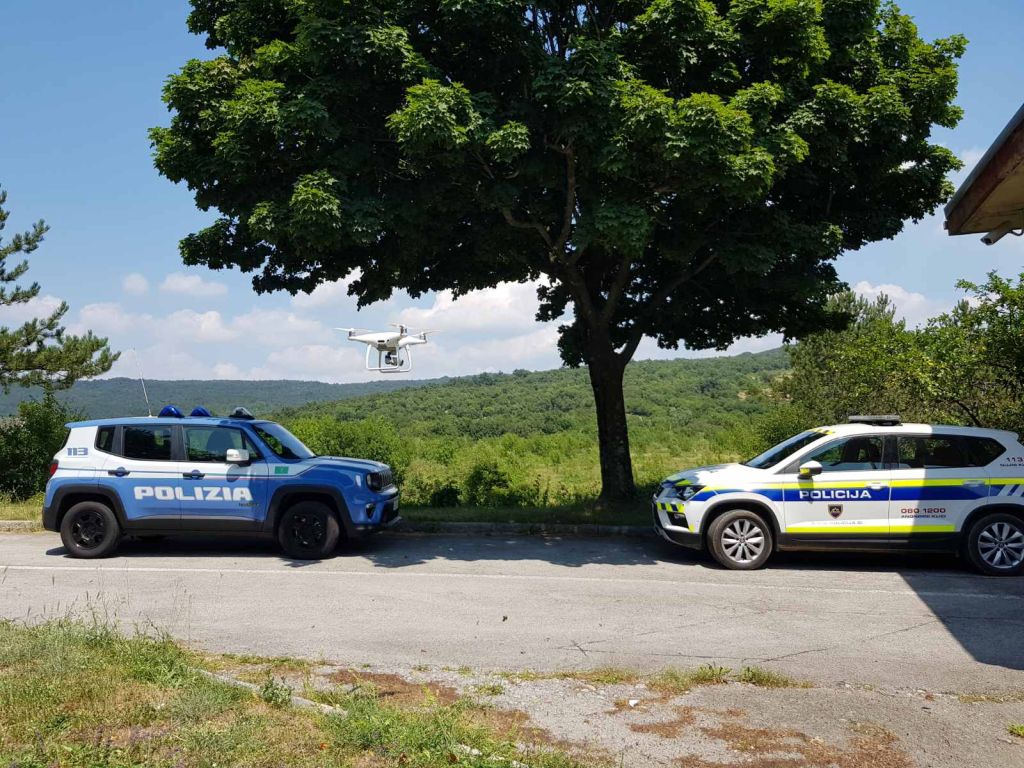In order to effectively prevent and detect irregular migration, joint mixed patrols consisting of members of the Slovenian and Austrian police forces started operating on the border between Slovenia and Austria last week.
Joint patrols are just one form of cross-border police cooperation
Joint patrolling is one of the ways in which the Slovenian police cooperate with the police forces of neighbouring countries Italy, Croatia, Hungary and Austria in the prevention and detection of irregular migration. Mixed patrols are carried out on the basis of agreements between the countries on cross-border police cooperation.

Slovenian-Italian police patrol
Mixed patrols on the borders of all neighbouring countries
Since 2019, joint patrols have been carried out on the common border between Slovenia and Italy. They are carried out in the areas of the Koper and Nova Gorica police directorates, including on trains. The work is carried out in accordance with the agreement, the implementation is good and efficient, and the need to extend the work of the mixed patrols is regularly assessed.
The Slovenian-Croatian mixed patrols had existed before Croatia joined the Schengen area and were further strengthened in 2023. They operate in all police directorates bordering Croatia.
With Hungary, the police conduct four mixed patrols per month, usually two on the Slovenian side (in the area of the Murska Sobota police directorate) and two on the Hungarian side.
Joint mixed patrols of Slovenian and Austrian police started last week. The joint patrols, which will initially run until the end of April, will be accompanied by joint tighter controls.
Free passage of travellers across borders does not affect security
The Slovenian police ensure a high level of security for all citizens and people on the territory of the country. They constantly adapt their working methods to the situation on the ground, which they constantly monitor: by changing tactics and working methods, by means of compensatory measures carries out on a random basis or on the basis of risk analyses to prevent cross-border crime and secondary migration, by using technical means and by strengthening international cooperation. The police are highly qualified and professional in their role of ensuring security at the local, national and EU levels. At the same time, the police ensure respect for democratic standards, including respect for the human rights of people along migration routes.
It is important to underline that Slovenia is part of the migration flows in the region. In 2022, the European Border and Coast Guard Agency (Frontex) recorded 330,000 irregular crossings at the EU's external borders on all migration routes, an increase of 64% compared to 2021 and the highest number since 2016.
Statistics clearly show that Slovenia cannot be an oasis without migration. The situation in the main countries of origin of migrants is deteriorating rather than improving. Thus, the critical mass of people who decide to migrate for various reasons is growing. In the period from 1 January to 31 December, 32,024 unauthorised border crossings were recorded in Slovenia. This is the result of a trend that started in March last year, with an increase of 214% compared to 2021, when there were 10,198 unauthorised crossings.

